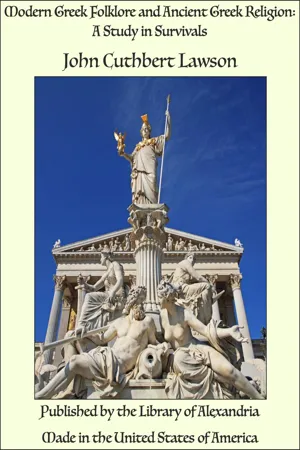
Modern Greek Folklore and Ancient Greek Religion: A Study in Survivals
- 213 pages
- English
- ePUB (mobile friendly)
- Available on iOS & Android
Modern Greek Folklore and Ancient Greek Religion: A Study in Survivals
About This Book
This book is the outcome of work undertaken in Greece during my two years' tenure of the Craven Studentship from 1898 to 1900. It is therefore my first duty gratefully to commemorate John, Lord Craven, to whose benefactions of two and a half centuries ago I owed my opportunity for research. The scheme of work originally proposed was the investigation of the customs and superstitions of modern Greece in their possible bearing upon the life and thought of ancient Greece; and to the Managers of the Craven Fund at that time, with whom was associated Mr R. A. Neil of Pembroke College to whose memory I have dedicated this book, I render hearty thanks for their willingness to encourage a venture new in direction, vague in scope, and possibly void of result. The course of research proposed was one which required as the first condition of any success considerable readiness in speaking and understanding the popular language, and to the attainment of this my first few months were necessarily devoted. When once the ear has become accustomed to the modern pronunciation, a knowledge of ancient Greek makes for rapid progress; and some three or four months spent chiefly in the cafés of small provincial towns rendered me fairly proficient in ordinary conversation. Subsequent practice enabled me also to follow conversations not intended for my ear; and on more than one occasion I obtained from the talk of peasants thus overheard information which they might have been chary of imparting to a stranger. The time at my disposal however, after I had sufficiently mastered the language, would have been far too short to allow of any complete enquiry into the beliefs and customs of the country, had it not been for the existence of two books, Das Volksleben der Neugriechen und das Hellenische Alterthum by Bernhard Schmidt, and ?????? ??? ??? ???? ??? ???????? ??????? by Professor Polites of Athens University, which at once supplied me with a working knowledge of the subject which I was studying and suggested certain directions in which further research might profitably be pursued. My debt to these two books is repeatedly acknowledged in the following pages; and if I have given references to Schmidt's work more frequently than to that of Polites, my reason is not that I owe less to the latter, but merely that the former is more generally accessible. In pursuit of my task I followed no special system. I have known of those who professed to obtain a complete knowledge of the folklore of a given village in the course of a few hours' visit, and whose method was to provide themselves with an introduction to the schoolmaster, who would generally be not even a native of the place, and to read out to him a formidable questionnaire, in the charitable and misplaced expectation that the answers given would be prompted not by courtesy and loquacity, which are the attributes of most Greeks, but by veracity, which is the attribute of few. The formal interview with paper and pencil is in my opinion a mistake. The 'educated' Greek whose pose is to despise the traditions of the common-folk will discourse upon them no less tediously than inaccurately for the sake of having his vapourings put on record; but the peasant who honestly believes the superstitions and scrupulously observes the customs of which he may happen to speak is silenced at once by the sight of a note-book. Apart however from this objection to being interviewed, the countryfolk are in general communicative enough. They do not indeed expect to be plied with questions until their own curiosity concerning the new-comer has been satisfied, and even then any questions on uncanny subjects must be discreetly introduced. But it is no difficult matter to start some suitable topic. A wedding, a funeral, or some local fête perhaps is in progress, and your host is eager to have the distinction of escorting you to it and explaining all the customs appropriate to the occasion.
Frequently asked questions
Information
Table of contents
- MODERN GREEK FOLKLORE AND ANCIENT GREEK RELIGION